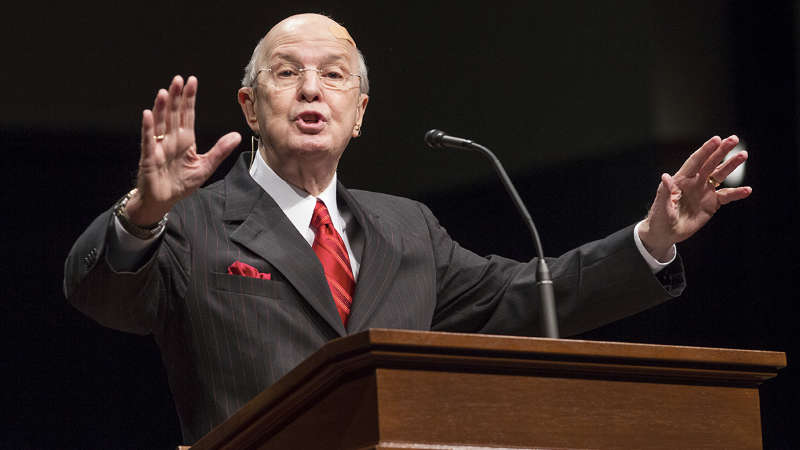
Samuel the King Maker. Sermon by Dr. Jerry Vines. 1 Samuel 1–12
Introduction: This is the beginning of a study called Kings on Parade, from the historical books in the Old Testament: Samuel, Kings, and Chronicles.
In these we have the life of the children of Israel from a theocracy to a monarchy, from the period of the judges to the period of the kings, and from the collapse of the kingdom into the divided kingdom.
Samuel was one of the great men in the Bible. He was not a king but was instead a kingmaker. He was the last of the judges and the first of the prophets.
Israel was transitioning from the time of the judges. At that time, every man did what was right in his own eyes (Judg. 21:25). Eli was the high priest, yet Eli was not what he should have been for God. His two sons, Hophni and Phinehas, were a disgrace (1 Sam. 1:3).
It is in this atmosphere that Samuel was born. I want us to look at the life of Samuel around several areas: his mother, his ministry, and his mission.
Samuel’s Mother
Very often, to find the secret of a man’s greatness, we look at his mother. We are introduced to Samuel’s mother, Hannah, in verse 2 of chapter 1. Her husband, Elkanah, had two wives—Hannah and Peninnah.
Hannah had no children, and Peninnah, who had children, made Hannah’s life miserable (1 Sam. 1:6, 7).
In the Old Testament being childless was considered a curse. That was not true though.
Elkanah and his family went to the house of the Lord every year for a time of worship. But this year was different because Hannah was so burdened by her situation that she wept and did not eat (1 Sam. 1: 7).
Starting in verse 9 of chapter 1 notice what Hannah did with her problem. She took her problem to God in prayer. She asked for a son and made a commitment to give him back to the Lord.
In 1 Samuel 1:13 Hannah spoke in her heart. Her lips were moving, but her voice was not heard. Eli thought she was drunk and rebuked her.
God remembered and answered her prayer (1 Sam 1:19). She had a boy and named him Samuel, “asked of God” (1 Sam 1:20). She kept her word and took Samuel to Shiloh after he was weaned (1 Sam. 1:24–28).
In chapter 2 we have the marvelous expression of her praise to God for an answered prayer. Prayer and praise always need to go together. To praise without prayer is presumption, but to pray without praise is ingratitude.
Every year Hannah brought Samuel a little robe when she came up to worship (1 Sam. 2:19). He grew before the Lord and with men (1 Sam. 2:21, 26)
Samuel’s Ministry
The word of the Lord was precious in those days (1 Sam. 3:1). It was not that God did not want to speak, but the people were not receptive to His voice.
Now we see the beautiful scene of the call of Samuel. Samuel went to bed for the night, and in verse 4 of chapter 3 the Lord called Samuel; he answered, “Here I am!”
Samuel thought it was Eli, and so Samuel goes to him. Eli said he didn’t call Samuel. This happened three times. Then Eli realized God was speaking to Samuel.
Eli told Samuel to lie down and if God called again to say, “Speak, Lord, for Thy servant hears.” Samuel went back to his room, and the fourth time the Lord called, “Samuel, Samuel” (1 Sam. 3:10) Samuel said, “Speak, LORD, for Your servant hears.” God told Samuel what He was going to do (1 Sam. 3:11).
Samuel had the call of God upon his life. He became a messenger to his nation. Look at his conduct (1 Sam. 7).
Samuel told the people they needed to return to the Lord with all their hearts (1 Sam. 7:3). They had to get the false gods out of their life.
Samuel not only preached but he also prayed. Look at 1 Samuel 7:5.
Did Samuel learn to pray from his mother? All through Samuel’s life he is a remarkable man of prayer.
Toward the end of his life he said, “Moreover as for me, God forbid that I should sin against the LORD in ceasing to pray for you: but I will teach you the good and the right way” (1 Sam. 12:23 KJV). Prayerlessness is a sin.
He was a great preacher and a great man of prayer. That’s not all. Turn to 1 Samuel 7:12. Samuel placed a stone in honor of God for the Israelites’ victory over the Philistines. He named the stone Ebenezer, which meant, “Thus far the LORD has helped us.” He was a great man of praise.
Look at his career (1 Sam. 7:15–17). Samuel had a tremendous ministry among the people of God in that day. Josephus, the first-century Jewish historian, said Samuel had an inborn love of justice (Jewish Antiquities 6.3.).
Samuel’s Mission
There were about twenty to twenty-five years between chapters 7 and 8. Samuel was now an old man, and his sons did not walk in his ways (1 Sam. 8:1–3). The elders met with Samuel and asked for a king (1 Sam. 8: 4, 5), but they already had a king–God. However, they wanted a king like the nations around them.
It displeased Samuel (1 Sam. 8:6). He felt a sense of rejection. They had not rejected him though, but they had rejected the Lord (1 Sam. 8:7).
I can imagine the heartache in Samuel’s heart, but he was faithful enough to share eternal truth with them (1 Sam. 8:9). He told them what to expect in verses 10–17 of chapter 8. Notice how many times the word take is used.
The people still wanted a king (1 Sam. 8:19). What was Samuel going to do? He listened to the Lord and anointed Saul. We must learn like Samuel to be gracious when transition comes along.
Conclusion
Chapter 12 is Samuel’s farewell address to the people. In 1 Samuel 12:3 he says, “Behold, here I am: witness against me before the LORD” (KJV).
They couldn’t point to one thing in his life that was wrong. He had lived for the Lord and had walked before the people in integrity, holiness, and honor.
When Samuel died the whole nation mourned (1 Sam. 25:1).
Jerry Vines
The Dr. Jerry Vines is a native of Carrollton, Georgia. He was educated at Mercer University (B.A.), New Orleans Theological Seminary (B.D.), and Luther Rice Seminary, (Th.D.). He has is a Baptist pastor and preacher for over 60 years






